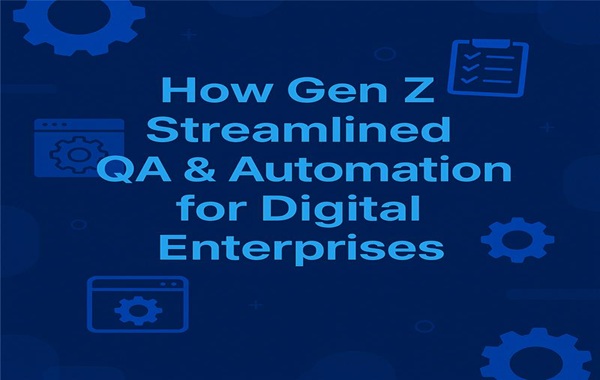Case Study 2 - How Gen Z Solutions Streamlined Operations for a Leading Healthcare Firm
Case Study: How Gen Z Solutions Streamlined QA & Automation for Digital Enterprises
Company: Gen Z Solutions
Focus Areas: Automation Testing, QA Outsourcing, Performance
Testing, Continuous Integration
Introduction
In today’s fast-paced digital world, businesses are constantly under pressure to deliver high-quality software quickly. However, the quality assurance (QA) process often becomes a bottleneck due to outdated practices, slow testing cycles, and the absence of automation. To overcome these challenges, Gen Z Solutions provides a comprehensive approach to QA and automation, helping companies streamline operations, reduce costs, and improve overall product quality.
This case study highlights how Gen Z Solutions revamped the testing landscape for digital teams, enabling them to release products faster and more reliably by integrating automation and QA best practices.
The QA Challenge
Many organizations face several common challenges in software testing:
· Repetitive and time-consuming manual testing
· Limited test coverage
· Poor performance under high user loads
· Lack of automation in regression and smoke testing
· Delayed bug detection and resolution
· Inconsistent QA processes across teams
· Limited integration between development and QA environments
These issues lead to delayed product launches, increased development costs, and post-release bugs that negatively impact user experience and brand reputation.
Gen Z Solutions’ Strategic Response
To address these challenges, Gen Z Solutions designed a structured, multi-phase plan tailored to the needs of modern development teams. The approach focused on test automation, performance evaluation, QA outsourcing, and continuous integration to build a seamless quality pipeline.
Phase 1: Building a Foundation of Automation
The first step was to introduce automation into the core of the QA process. Gen Z Solutions created robust automation test suites to replace repetitive manual tasks and improve testing speed.
Automation frameworks were implemented for various testing needs such as:
· Functional testing
· Regression testing
· Cross-browser testing
· Mobile app testing
By leveraging tools like Selenium, Appium, and TestNG, the QA teams reduced manual effort significantly and were able to execute test cycles more frequently with consistent accuracy. Automation became the backbone of all regression cycles, freeing up the team to focus on exploratory and advanced testing.
Phase 2: Performance Testing Implementation
To ensure applications could handle real-world traffic and usage, performance testing was added to the process. Gen Z Solutions used tools such as Apache JMeter to simulate thousands of concurrent users and analyze system behavior.
The results revealed system bottlenecks, slow-loading APIs, and database inefficiencies, which were then addressed to ensure optimal performance during peak loads. This not only improved response times but also enhanced overall user experience, especially for high-demand web platforms.
Phase 3: Continuous Integration and Testing
To create a seamless flow between development and testing, Gen Z Solutions introduced Continuous Integration (CI) and Continuous Testing mechanisms.
Key actions included:
· Setting up Jenkins pipelines for automated test executions
· Integrating with GitHub for real-time code versioning
· Generating immediate feedback reports after each test run
· Creating automated alert systems for test failures and bugs
With CI in place, developers received quick test results for every commit, allowing immediate fixes and reducing the chances of last-minute surprises before release.
Phase 4: Scalable QA Outsourcing
Instead of expanding costly in-house QA teams, many clients opted for Gen Z Solutions’ outsourcing services. Dedicated QA teams were provided for specific projects, ensuring seamless collaboration, faster ramp-up times, and reduced costs.
The outsourced QA experts operated as an extension of the client’s internal team, handling everything from test planning and execution to defect management and reporting. This allowed the core development team to focus more on building features while Gen Z Solutions ensured product quality.
Outcomes and Achievements
The impact of this QA transformation was significant. Here are some of the key achievements and improvements observed:
· Faster test execution cycles reduced time-to-market for new product releases.
· Test coverage increased across critical user journeys and platforms.
· Automated test cases detected bugs earlier in the cycle, reducing rework.
· Load testing prevented performance failures in live environments.
· Integration with CI tools ensured continuous quality feedback for every deployment.
· QA outsourcing lowered operational costs while maintaining high testing standards.
Teams became more agile and confident in releasing software updates, with fewer bugs reported in production and higher customer satisfaction.
Technology Stack Used
Gen Z Solutions applied a mix of open-source and industry-leading tools depending on client needs:
· Test Automation Tools: Selenium, Appium, TestNG, Cucumber
· Performance Testing Tools: Apache JMeter
· CI/CD Tools: Jenkins, GitHub, Bitbucket
· Bug Tracking Tools: Jira, Bugzilla
· Test Reporting: Allure, ExtentReports
· Collaboration Tools: Slack, Microsoft Teams
These tools were customized and integrated into the client’s existing infrastructure to ensure minimal disruption and maximum productivity.
Benefits Beyond Technology
While tools and automation were important, the real transformation came from a change in mindset. Gen Z Solutions encouraged a shift toward a quality-first culture, where testing wasn’t just a phase at the end but an integral part of the development process.
Key benefits of this approach included:
· Increased trust in the QA process
· Better collaboration between developers and testers
· Clear ownership of bugs and faster resolution
· Real-time insights into code quality and performance
· Reduced pressure during release cycles
By embedding QA into the heart of development, software teams could release faster, reduce risk, and improve customer experience without overextending their resources.
Why Choose Gen Z Solutions
Gen Z Solutions stands out as a strategic QA partner, not just a vendor. The team brings deep expertise, proven methodologies, and scalable solutions that fit organizations of all sizes—from startups to enterprises.
Key differentiators include:
· Custom-built automation frameworks
· End-to-end testing solutions tailored to each product
· Cost-effective QA outsourcing options
· Continuous support and performance improvement strategies
· Transparent communication and agile delivery
Clients can confidently accelerate innovation without compromising on product quality or customer trust.
Conclusion
In today’s digital economy, software quality can no longer be an afterthought. With Gen Z Solutions, companies can establish a strong, scalable QA foundation powered by automation, performance testing, and continuous delivery practices.
This case study shows that with the right strategy, tools, and partner, businesses can turn QA from a challenge into a competitive advantage.
Interested in transforming your QA process?
Visit: www.genzsoln.com
Email: info@genzsoln.com
Let’s build quality together—faster, smarter, and better.


